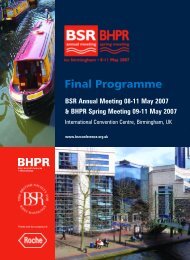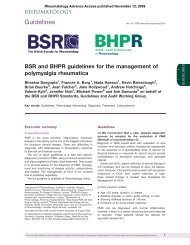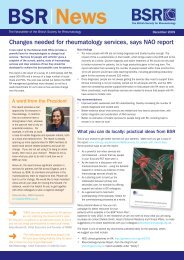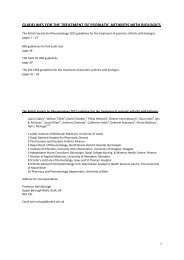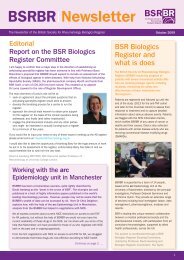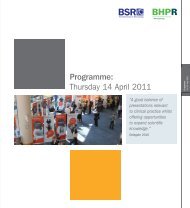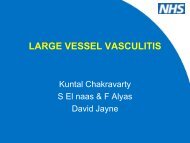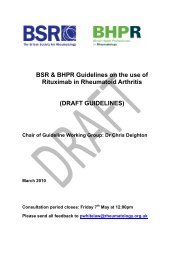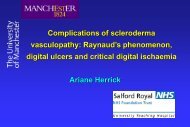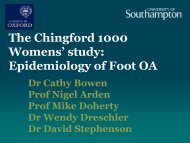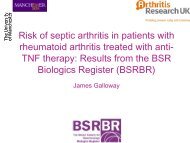The continuing professional development for health professionals ...
The continuing professional development for health professionals ...
The continuing professional development for health professionals ...
You also want an ePaper? Increase the reach of your titles
YUMPU automatically turns print PDFs into web optimized ePapers that Google loves.
Continuing Professional Development<br />
<strong>for</strong> Nurses and Allied Health<br />
Professionals in Musculoskeletal<br />
Settings: a National UK Survey<br />
Jo Adams; Sarah Ryan; Hannah Haywood;<br />
Helen Pain
Jo Adams<br />
Continuing Professional Development <strong>for</strong> Nurses and<br />
Allied Health Professionals in Musculoskeletal Settings:<br />
a National UK Survey<br />
Presenter Disclosure In<strong>for</strong>mation:<br />
Declarations of interest: None<br />
This speaker has no conflicts of interest
Continuing Professional Development (CPD)<br />
‣ Includes “a wide range of learning activities through which<br />
<strong>professional</strong>s maintain and develop throughout their career to<br />
ensure that they retain their capacity to practise safely,<br />
effectively and legally within their evolving scope of practice” 1<br />
‣ Conducted to provide the best possible care <strong>for</strong> patients and can<br />
include <strong>for</strong>mal or in<strong>for</strong>mal activities<br />
‣ CPD is a registration and <strong>professional</strong> requirement although<br />
recommendations <strong>for</strong> the time spent on CPD varies. No specific<br />
time requirements <strong>for</strong> UK AHPs to 35 hours over three years <strong>for</strong><br />
UK Nurses.
Profession<br />
United Kingdom<br />
Nursing<br />
Requirements<br />
35 hours every 3 years, evidenced in portfolio that may be audited.<br />
Occ <strong>The</strong>rapy/<br />
Physiotherapy/Podiatry<br />
Australia<br />
Nursing<br />
Occupational <strong>The</strong>rapy<br />
Physiotherapy<br />
No minimum requirement, but CPD portfolio must be kept by all members of register. This may be<br />
audited biannually.<br />
20 hours per year Portfolio must be kept in case of audit.<br />
No minimum requirement, but evidence of CPD must be recorded in portfolio and may be audited.<br />
20 hours per year, recorded in portfolio which may be audited.<br />
Podiatry 20 hours per year (plus extra 10 hours per year <strong>for</strong> those with medicine endorsements and extra 20<br />
hours per year <strong>for</strong> podiatric surgeons), recorded in portfolio which may be audited.<br />
USA<br />
Nursing<br />
Occupational <strong>The</strong>rapy<br />
Physiotherapy<br />
Podiatry<br />
New Zealand<br />
Nursing<br />
Occupational <strong>The</strong>rapy<br />
Physiotherapy<br />
Podiatry<br />
Individual states vary; some require Continuing Education whilst others do not<br />
Varies between states, from no mandatory CPD requirement to a minimum of 40 hours every 2 years.<br />
Varies between states, however the FSBPT recommend that every physiotherapist should obtain a<br />
minimum of 30 <strong>continuing</strong> competence units every 2 years. Unit value of activity depends on<br />
how well it meets established criteria.<br />
Requirements vary in terms of number of hours of CPD. No general <strong>professional</strong> recommendations<br />
were identified<br />
60 hours of <strong>professional</strong> <strong>development</strong> in 3 years. Yearly audit of nurses renewing their practice<br />
certificate.<br />
Continuing Competence Recertification Portfolio has to be kept and may be audited on a 5 year cycle.<br />
100 recorded CPD hours/3-year cycle; 50 practical CPD hours/3-year cycle; one<br />
<strong>professional</strong> peer review/3-year cycle<br />
Equivalent of 100 hours CPD activity (<strong>for</strong>mal and in<strong>for</strong>mal)/4-year cycle, audited.<br />
Table 1: UK, Australia, USA and New Zealand CPD requirements
Background<br />
• Musculoskeletal <strong>health</strong> care <strong>professional</strong>s have expressed<br />
concern at the increased difficulties in undertaking <strong>continuing</strong><br />
<strong>professional</strong> <strong>development</strong> (CPD).<br />
• Timely with rise in extended scope practitioner roles<br />
• Discrepancy when compared with requirements, provision and<br />
funding <strong>for</strong> medical colleagues
Arthritis Research UK:<br />
Educational Strategy Award<br />
• To explore the current situation regarding CPD amongst nurses<br />
and AHPs working with people who have musculoskeletal<br />
conditions.<br />
To include:<br />
• An exploration of the challenges faced to take part in CPD<br />
• Recommendations to be made on how to provide the best CPD<br />
opportunities <strong>for</strong> <strong>health</strong> <strong>professional</strong>s in the UK who work with<br />
people who have musculoskeletal conditions
• National UK electronic survey<br />
Methods<br />
• Phase II of a two part research project<br />
• Phase I used three focus groups and two telephone conference calls to<br />
explore patients, clinicians and managers experiences of CPD within MSK<br />
services 2 . <strong>The</strong>se findings in<strong>for</strong>med the content and <strong>development</strong> of this<br />
electronic questionnaire survey.<br />
• Survey designed using Question Mark Perception, administered from the<br />
University of Southampton and distributed via <strong>professional</strong> bodies and BHPR.<br />
• Results were collected online and analysed in SPSS PASW 17 using frequency<br />
data and χ2 analyses.<br />
2<br />
Haywood H et al (2011) An exploration of the experience of <strong>continuing</strong> <strong>professional</strong> <strong>development</strong> with nurses and<br />
allied <strong>health</strong> <strong>professional</strong>s working in musculoskeletal services in England ARD 2011;70(Suppl3):753
Recruitment<br />
• AGILE<br />
• Aquatic <strong>The</strong>rapy Association of Chartered<br />
Physiotherapists<br />
• Arthritis and Musculoskeletal Alliance<br />
• Arthritis Research UK<br />
• Association of Chartered Physiotherapists in the<br />
Community<br />
• Association of Orthopaedic Chartered<br />
Physiotherapists<br />
• Back Care<br />
• British Health Professionals in Rheumatology<br />
• College of Occupational <strong>The</strong>rapists Specialist<br />
Section – Independent Practitioners<br />
• College of Occupational <strong>The</strong>rapists Specialist<br />
Section – Rheumatology<br />
• College of Occupational <strong>The</strong>rapists website, CPD<br />
page<br />
• Extended Scope Practitioners<br />
• Functional Lower Limb Interest Community<br />
• Harrison Training<br />
• Head OTs and OT Leads in Hampshire<br />
• Leaders and Managers of Physiotherapy Services<br />
(<strong>for</strong>merly the Association of Chartered<br />
Physiotherapists in Management)<br />
• National Rheumatoid Arthritis Society<br />
• Physiotherapy Pain Association<br />
• Podiatry Rheumatic Care Association<br />
• Rheumatic Care Association of Chartered<br />
Physiotherapists<br />
• Royal College of Nursing Rheumatology Forum<br />
• Social Care Distribution from COT<br />
• Society of Chiropodists and Podiatrists Faculty of<br />
Managers<br />
• South Central SHA AHP Leads<br />
• UoS Faculty of Health Sciences, MSc Alumni
Results<br />
Total 591<br />
responses<br />
Reviewed 586<br />
responses<br />
354 complete<br />
responses<br />
analysed<br />
5 not MSK/<br />
Other<br />
193 incomplete survey<br />
39 initial in<strong>for</strong>mation<br />
only
Professional groups<br />
9.9%<br />
0.6%<br />
7.3%<br />
Nursing<br />
Occupational<br />
<strong>The</strong>rapy<br />
30.2%<br />
Orthotics<br />
Physiotherapy<br />
51.7%<br />
0.3%<br />
Podiatry<br />
Not answered
Country of work<br />
14%<br />
4%<br />
England<br />
2%<br />
Northern Ireland<br />
Scotland<br />
80%<br />
Wales
Number of responses<br />
Sector of work<br />
350<br />
300<br />
250<br />
291<br />
• Multiple responses were<br />
allowed <strong>for</strong> this question.<br />
• Many worked in more than<br />
one sector.<br />
200<br />
150<br />
100<br />
50<br />
0<br />
55 57<br />
3<br />
46<br />
NHS<br />
Local<br />
authority<br />
Private sector<br />
Sector<br />
Charitable<br />
company<br />
Self-employed
Workplace setting<br />
1% Community<br />
30%<br />
Inpatient<br />
61%<br />
8%<br />
Outpatient<br />
Not<br />
Answered
Number of responses<br />
Level of experience<br />
325<br />
300<br />
275<br />
250<br />
225<br />
200<br />
175<br />
150<br />
125<br />
100<br />
75<br />
50<br />
25<br />
0<br />
78<br />
219<br />
5<br />
1<br />
17<br />
32<br />
< 2 2 - 5 > 5<br />
Years of experience working in musculoskeletal settings<br />
Manager<br />
Nonmanager
Number of Responses<br />
<strong>The</strong> services in which people worked<br />
200<br />
180<br />
160<br />
140<br />
120<br />
100<br />
80<br />
60<br />
40<br />
20<br />
0<br />
124<br />
90<br />
70<br />
57<br />
175<br />
122<br />
• Multiple responses were allowed.<br />
• Many worked <strong>for</strong> more than one<br />
service.<br />
• 122 worked <strong>for</strong> another type of<br />
service not listed, many of which<br />
were in addition to at least one of<br />
the services listed.<br />
Rheumatology<br />
Orthopaedics<br />
Elderly Care<br />
Pain Service<br />
Musculoskeletal Outpatients<br />
Service<br />
Other<br />
• Other services reported included<br />
general podiatry (n=13) and adult<br />
services (n=33).
Number of responses<br />
CPD activities undertaken in the last 12 months<br />
350<br />
300<br />
250<br />
200<br />
150<br />
100<br />
50<br />
0<br />
225<br />
61<br />
312<br />
111<br />
164 147 138<br />
294<br />
156<br />
255<br />
20<br />
short <strong>for</strong>mal courses<br />
extended <strong>for</strong>mal courses<br />
reading <strong>professional</strong> papers<br />
shadowing<br />
conferences<br />
CPD network/group<br />
mentoring<br />
reflection<br />
e-learning<br />
in-house training<br />
other<br />
CPD Activity
Number of responses<br />
Number of responses<br />
Identifying learning and <strong>professional</strong><br />
<strong>development</strong> needs<br />
400<br />
350<br />
300<br />
250<br />
200<br />
150<br />
100<br />
50<br />
0<br />
Identify my own<br />
341<br />
253<br />
177<br />
120<br />
Supervision<br />
Per<strong>for</strong>mance review<br />
Training review<br />
Methods used to identify CPD needs<br />
Other<br />
32<br />
400<br />
350<br />
300<br />
250<br />
200<br />
150<br />
100<br />
50<br />
0<br />
Post and job description<br />
286<br />
Needs of service<br />
331<br />
Needs of local community<br />
208<br />
Anticipated future needs<br />
282<br />
232<br />
159<br />
KSF<br />
Published competencies<br />
Sources used to identify CPD needs<br />
Other source<br />
18
Number of responses<br />
Reasons <strong>for</strong> doing CPD<br />
250<br />
200<br />
200<br />
150<br />
100<br />
50<br />
132<br />
100<br />
79<br />
63<br />
60<br />
16<br />
23<br />
10 1<br />
0<br />
Improve patient care<br />
stay up-to-date<br />
maintain skills<br />
HPC/NMC requirements<br />
confidence in own practice<br />
further my career<br />
service <strong>development</strong><br />
stay enthusiastic<br />
Reasons to undertake CPD<br />
develop personal interests<br />
other reasons<br />
• 124 people gave more than<br />
the three main reasons that we<br />
asked <strong>for</strong>, there<strong>for</strong>e 230 results<br />
were analysed.<br />
• A higher proportion of<br />
managers (45%) than nonmanagers<br />
(20%) cited service<br />
<strong>development</strong> as a reason <strong>for</strong><br />
undertaking CPD (p
Number of responses<br />
Barriers to CPD<br />
250<br />
200<br />
150<br />
100<br />
50<br />
0<br />
Lack of funding<br />
207<br />
181<br />
92<br />
103<br />
13<br />
18<br />
Lack of study leave<br />
Lack of confidence in ability<br />
Commitments outside work<br />
Too many other tasks<br />
Negative attitudes to CPD<br />
Lack of appropriate courses<br />
96<br />
Other<br />
15<br />
• Other barriers identified<br />
included difficulty<br />
attending courses that<br />
were held far from the<br />
respondents place of<br />
work/residence (n=12).<br />
• Travelling costs <strong>for</strong> some<br />
may be prohibitive if<br />
there was a long<br />
distance to travel.<br />
Barriers to CPD
Specific Issues<br />
Funding<br />
Specific Issues<br />
Time<br />
Support
Funding<br />
• 12% received full funding<br />
• 56% received partial funding<br />
• 21% received no funding<br />
NHS<br />
Non-NHS<br />
• NHS vs Non-NHS<br />
– Proportions are<br />
significantly different (p
Time<br />
• Hours of own time spent on CPD:<br />
– 1-4 hours per month: 61%<br />
– 5-8 hours per month: 27%<br />
– more than eight hours each month: 12%<br />
• Employers were thought to regard in<strong>for</strong>mal CPD as a legitimate use of work time by 70% of<br />
respondents.<br />
• Pressure of other work-based and external commitments were the most commonly cited<br />
barriers to accessing CPD after lack of funding.<br />
• Self-employed vs non self-employed:<br />
– Proportions are significantly<br />
different (p
Support from employers<br />
• Negative attitudes to CPD at work was reported as one of the three main<br />
barriers to CPD by only 7%.<br />
• An employer who was very or fairly supportive of CPD activities was<br />
reported by 86%.<br />
• A higher proportion (95%) of non-NHS employees stated that their<br />
employers were fairly or very supportive, compared with 84% of NHS<br />
employees (p
Support from <strong>professional</strong> bodies<br />
•<strong>The</strong> proportions of people from each <strong>professional</strong> group who<br />
believed their <strong>professional</strong> body to help them meet the CPD<br />
requirements of the HPC or NMC was significantly different<br />
(p
Summary<br />
• To improve patient care is a frequent reason <strong>for</strong> CPD.<br />
• Managers are more likely to do CPD in order to improve service delivery than<br />
non-managers.<br />
• A lack of funding and having too many other tasks to complete at work were<br />
the two most common barriers to undertaking CPD activities.<br />
• Over half of the people who answered the survey received partial funding <strong>for</strong><br />
CPD activities and 21% received no funding at all.<br />
• Most people felt that their employers regarded the use of work-time <strong>for</strong> in<strong>for</strong>mal<br />
CPD activities was legitimate, but the pressure of too many other tasks to<br />
complete during work was a significant barrier to undertaking CPD activities <strong>for</strong><br />
many.<br />
• Overall there was a positive feeling that employers were supportive of CPD,<br />
and each <strong>professional</strong> body was seen to be helpful in meeting the CPD<br />
requirements by the majority of respondents in each profession.
Thank you to:<br />
• All participants <strong>for</strong> taking part in the focus groups and online survey<br />
• Our Expert Steering Committee<br />
• Alan Borthwick, Senior Lecturer, Faculty of Health Sciences, University of Southampton.<br />
• Mark Cole, Lecturer, Faculty of Health Sciences, University of Southampton.<br />
• Janet Cushnaghan, Research Fellow, <strong>The</strong> Medical Research Council Lifecourse<br />
Epidemiology Unit, University of Southampton.<br />
• Elaine Dawson Nurse Practitioner, <strong>The</strong> Orchard Practice, Christchurch.<br />
• Carolyn Evans, Strategic Service Manager, Hampshire County Council; COT/BAOT<br />
Council Member (elect) Social Care & Community Services.<br />
• Mandy Kness, BA, patient representative.<br />
• Arthritis Research UK <strong>for</strong> acknowledging the pressures on Nurses’ and AHPs’ CPD time<br />
and funding this study.



